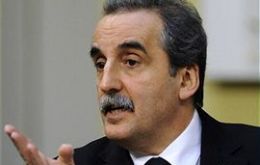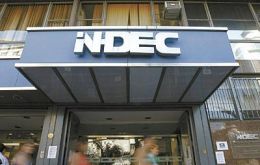MercoPress. South Atlantic News Agency
Tag: Guillermo Moreno
-
Monday, April 2nd 2012 - 09:40 UTC
Argentina must act seriously and stop childish attitudes, says top industry leader

Argentina’s notorious Interior Trade Secretary Guillermo Moreno has triggered another controversy, this time among board members from Industries Union of Argentina, UIA, involving one of its vice-presidents and the CEO of Fiat.
-
Friday, March 30th 2012 - 06:39 UTC
Argentina promises to reopen book imports: ‘lead poisoning ink argument too heavy’

Argentina’s restrictions on books imports based on the ‘lead content of the ink in which they are published’ and the fact the Argentine government described the implementation as a “safeguard for human health” echoed worldwide, and official sources have now promised the situation will “be back to normal” in a few weeks.
-
Thursday, March 15th 2012 - 06:09 UTC
IMF confirms closing offices in Mongolia, Lebanon and G-20 member Argentina

The International Monetary Fund (IMF) will close its Buenos Aires office in protest to Domestic Trade Secretary Guillermo Moreno’s decision to accuse the organization in court, urging it to explain how it calculates Argentina’s inflation rate, sources said.
-
Friday, February 24th 2012 - 07:38 UTC
Argentina and the price of cooking the books, according to The Economist

History has left Argentines with more than their share of economic trauma. Having twice suffered destructive bouts of hyperinflation in the late 1980s, they are sensitive to rising prices. When they spot inflation their instinct is to dump the peso and buy dollars.
-
Wednesday, February 8th 2012 - 22:03 UTC
Why you can’t find a Big Mac on Argentina’s Mc Donald’s menu?

Argentina’s booming economy has been one of the few bright lights in an otherwise gloomy global financial picture the last few years. But inflation of up to 25% threatens that growth. It's one of the world’s highest inflation rates, reports the US public funded Public Radio International.
-
Monday, January 23rd 2012 - 04:12 UTC
Foreign airlines in Argentina told to privilege local service-contractors and suppliers

Fifteen foreign airlines operating from Argentina will have to report to the powerful Home Trade Secretary Guillermo Moreno a proposal to reduce their US dollars overseas remittances particularly to suppliers and services contracted overseas. It is estimated that these airlines remit a billion US dollars annually.
-
Saturday, October 1st 2011 - 00:59 UTC
Publishing houses told to print in Argentina while imported books are blocked in Customs

Argentina's booksellers claim over a million imported books remain stacked up in customs while the government of President Cristina Fernandez moves ahead with its policy of substituting imports and defending local jobs and the domestic market.
-
Monday, September 26th 2011 - 04:43 UTC
Argentine inflation controversy reaches the courts: Judge subpoenaed reporters

An Argentine Judge has subpoenaed six newspapers for the names and phone numbers of all reporters and editors who have covered Argentina's economy the past five years, so they can be called as witnesses against their sources.
-
Tuesday, August 9th 2011 - 22:17 UTC
Argentina’s Congress ‘inflation index’ for July, 1.62%, doubles the official rate

Argentina’s “Congress inflation index” reached 1.62% in July, confirming well over 23% for the last twelve months according to the latest release from the Lower House.
-
Wednesday, June 15th 2011 - 23:35 UTC
Argentina’s official May ‘fantasy’ inflation 0.7%; private consultants, 1.5%

Inflation in Argentina reached 0.7% in May compared to the volume reported in the previous month, the Indec national statistics bureau announced on Wednesday. The official rate is less than half what was presented on Tuesday by opposition lawmakers, which they assured reached 1.5% and 23% in the last twelve months.
